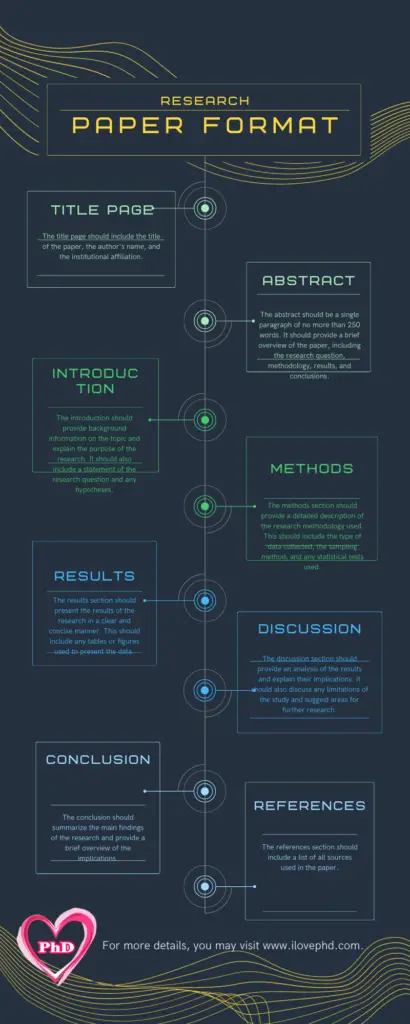Writing and publishing a research paper is important for an/academician, researcher, and scientist. Publishing the article in a reputed and high-impact factor journal may fetch you a scholarship, and funding to carry out R&D projects and make your profile strong. Here, in iLovePhD you can find out everything you need to know to write an effective research paper with a sample research paper format.
How to Write a Research Paper?
The first step is to select your target journal before start writing your article. It could be easy to shape your manuscript according to the journal’s requirement, which would increase the chance of accepting your manuscript. After choosing your target journal, start reading the research papers relevant to your work, which are already published in that journal. This can help you to get an idea of the editor’s expectation and guide your writing.
Also Read: 6 Steps to Select a Right Journal to Publish your Research Paper
The strongest research papers generally have one or two strong points to make. The authors register those points powerfully with results and suitable evidence.
ilovephd.com
Use clear and simple language that helps the reader to read and understand easily. Ensure that your present research work is unique and novel from already published works, though your concept exists. Write your article with full confidence to give your reader certainty in your work. Relate your research with key work that is reported already and show how you are working to eliminate the research gap. Plan a logical sequence of the manuscript, and develop ideas succinctly and precisely.
The structure of the research paper is as important as the content itself and helps the reader to get a clear understanding of your work. The common outline of the research paper is presented below.
Good Research Paper Format
Title
The title of a manuscript should indicate the theme of the research work. It should be clear, specific, and attractive to the readers to read the article.
Abstract
- In addition to the title that grabs the reader’s attention, a well-written abstract is important.
- The abstract is what researchers/scientist reads first to identify whether the article is worth reading.
- It is suggested to rewrite the abstract after finishing writing the entire manuscript.
- Superfluous sentences and irrelevant statements should be eliminated.
- The authors must highlight the novelty of the work. The abstract should focus on the following points.
- What was investigated in the study (State briefly the specific objectives of the study)
- Why was it done
- How was it done
- What are the important findings of the study
- What is the significance of the study
The abstract can also be represented in a graphical format. Some journals mandate to submission a graphical abstract. The procedure to create a graphical abstract can be found in HOW TO CREATE GRAPHICAL ABSTRACT.
Keywords
The keywords should be relevant to the work and it should be easy for the readers to search for the manuscript. Five to seven keywords are essential.
Introduction
- The introduction should address the significance and impact of the manuscript.
- The research on a particular area may be intensively published so that describing novelty is of significance.
- It should have a clear point regarding the advancement or improvement and a motivation to carry out the research work.
- Discuss the literature about the work and identify the research gap.
- The literature review should take into consideration the current state of the literature.
- Frame the objectives of the study based on the research gap.
- It is suggested to write the introduction and conclusion last, once the skeleton of the manuscript becomes clear.
Methodology
- The methodology should elaborate on how the research study was conducted.
- It includes experimental procedures/steps followed, preparation methods, instrumentation used, and formula.
- The readers should get a clear vision of how the research study was carried out by reading the methods section.
Results and Discussion
- The results and discussion section of any manuscript are discussed in detail the research findings.
- The discussion needs to be beyond the findings and emphasize more on the claims.
- The interpretations of the experimental results should be explained scientifically, and logically in line with fundamental science and principles.
- To support the findings, the results can be expressed in any format (plots, models, expressions, etc.).
- The results reported in your manuscript should be original, reliable, ad reproducible.
- The results obtained in the present study may also be compared with the results reported in the literature.
Conclusion
- It includes the summary of the research findings and the overall impression of the study.
- A good conclusion will complete the article’s arguments, research outcome, and further scope of studies.
- It should be strong enough to convince the researchers.
References
- Citing references in appropriate places in the paper is necessary and important to avoid plagiarism.
- When you cite a reference, make sure that you understand its relevance to your research work.
- The references should be listed at the end of the manuscript and each journal has its referencing style.
Acknowledgment
The authors can submit a brief acknowledgment of any financial, instrumentation, and academic support received about research work.
Also Read: 10 AI Software Tools to Outlining a Research Paper

Hope, this article helps you learn how to write a research paper for your research work in a good format.
[…] The most common mistake done by many researchers in recent time is, hiring a writer to write a thesis or research manuscript. […]
[…] How to Write a Research Article? Good Manuscript Structure […]
[…] How to Write a Research Article? Good Manuscript Structure […]
[…] How to Write a Research Paper? Research Paper Format […]
[…] Also Read: How to Write a Research Paper? Research Paper Format […]